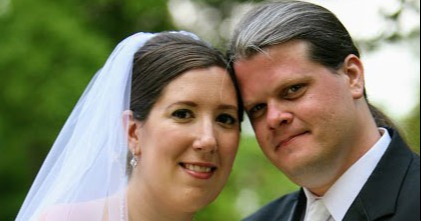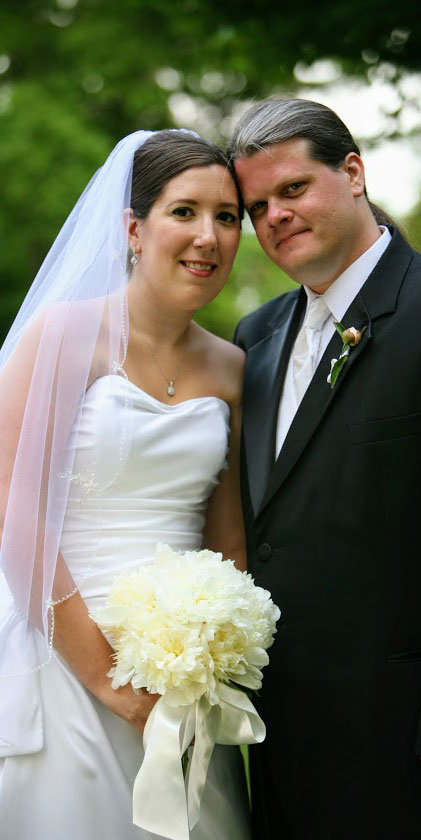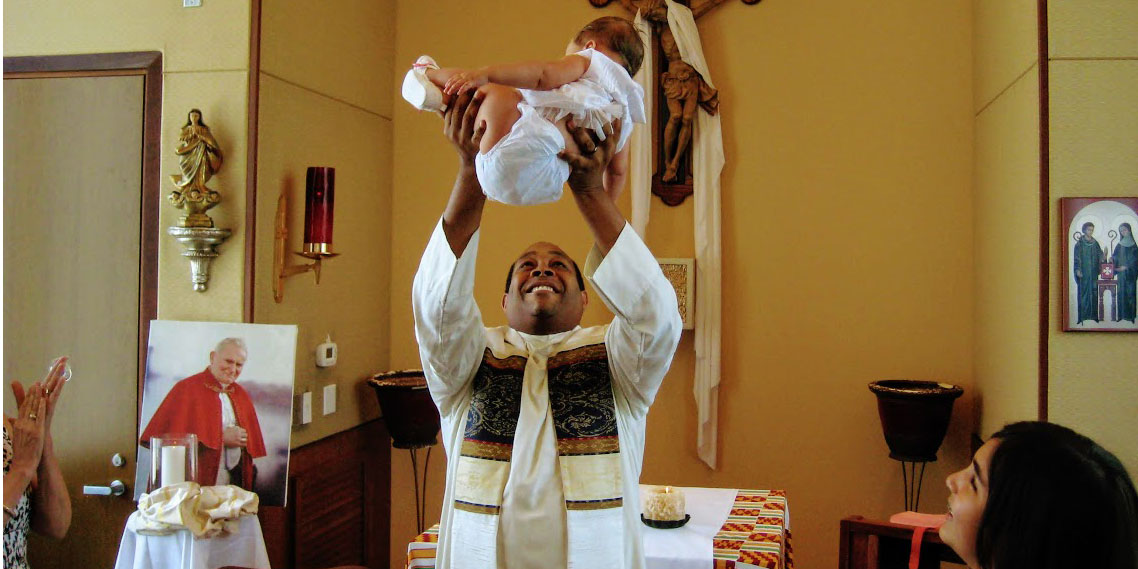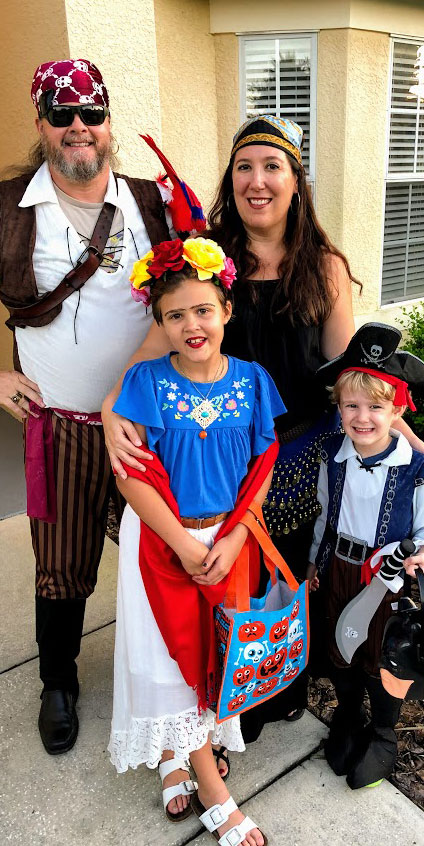Married Saint Leo English Professors Make a Difference
Meet Drs. Lee Hobbs and Allyson Marino, two married English professors who first met as Ph.D. students and have taught at Saint Leo University for 12 years.

Meet Drs. Lee Hobbs and Allyson Marino, two married English professors who first met as Ph.D. students and have taught at Saint Leo University for 12 years.


Nearly two decades ago, Drs. Lee Hobbs and Allyson Marino first laid eyes on each other during an orientation program for their doctoral studies. Little did they know they would later marry, start a family, and enjoy rewarding careers teaching at Saint Leo University.
"I made eye contact with her when she walked into the room and, for me, at least, it was love at first sight," Hobbs recalls. "Later, I put a name to a face when we discovered that we had already been messaging on the program's online discussion boards. Soon after, a mutual friend in the program played matchmaker and invited us both to a little soirée of new postgraduate students. So, we talked, I worked up the nerve to ask her out, we started dating, and the rest, as they say, is history."
Marino agrees that meeting Hobbs resulted in an instant connection.
"Everything about it felt meant to be," she says.
Hobbs, 52, is originally from Mobile, AL. He spent most of his childhood in Escatawpa, MS. He earned a BA in Art with an English minor from the University of South Alabama and an MLA in Literature from Spring Hill College, both in Mobile, AL.
For most of the 1990s, Hobbs lived in Poland and traveled around Europe teaching English and working as a licensed dermagraphic technician, more commonly known as a professional tattooist. He has previously taught at Seton Hill University, St. Francis University, and the University of Silesia in Poland. He also taught English as a Second Language to younger students around Poland.
The 42-year-old Marino hails from Long Island, NY but spent much of her childhood around the Empire State. She attended SUNY Fredonia for her bachelor's degree in English and SUNY College at Buffalo for her master's in English.
In late 2003, Hobbs and Marino first met in their doctoral program in literature and criticism at Indiana University of Pennsylvania.
"I ended up at IUP almost by accident," Marino explains. "I struggled with an illness and missed deadlines. I felt unsure about my future path. I knew I wanted to teach and write, but that was it. A mentor in Buffalo suggested IUP and it ended up being the best decision I could have made."
While completing their postgraduate work, they both taught courses at IUP and went on to get married in the summer of 2007. They spent a total of five years in Indiana, PA before relocating to Wesley Chapel, FL in 2008.
Hobbs and Marino originally interviewed for teaching roles at institutions in Pennsylvania and Maryland. They first made a connection to Saint Leo University in 2007 at the Modern Language Association's annual meeting in Chicago.
"The hiring committee members were Dr. Mary Spoto and the late, great Dr. Kurt Wilt," Hobbs says. "Aly already had family in Florida and spent many summers there, while I was a Gulf coast native from Mobile, an area geographically similar to Tampa. We had already decided, even before marriage, that since we were both essentially raised 'in the sight of water,' living within driving distance to an ocean was going to be a priority and life goal. Finalizing our job offers with Saint Leo University was a no-brainer."
Another longtime Saint Leo English instructor was also at that same gathering in the Windy City.
"Ironically, Dr. Patrick Crerand was also hired at the same time as us. He was also at that MLA conference in Chicago," Hobbs says.
While working at Saint Leo, the couple brought two children into their family. They have a 10-year-old daughter, Lila, and a five-year-old son, Grayson.
 "As a baby, Lila was actually christened by Fr. Stephan Brown in the Saint Leo chapel on campus," Hobbs fondly recalls. "She's also very involved with campus life and has even been featured in several theatrical productions. Probably due to the fact that each of their parents are literature professors, both children are highly creative, avid readers, lovers of popular culture, and little technology gurus. Can you tell that we are proud of them?"
"As a baby, Lila was actually christened by Fr. Stephan Brown in the Saint Leo chapel on campus," Hobbs fondly recalls. "She's also very involved with campus life and has even been featured in several theatrical productions. Probably due to the fact that each of their parents are literature professors, both children are highly creative, avid readers, lovers of popular culture, and little technology gurus. Can you tell that we are proud of them?"
He says the university has fully embraced his family.
"Since we are a 'family first' family unit, we are pleased to be a part of the Saint Leo University community. Everyone here has always shared this core value with us through ongoing support and encouragement. Who knows? One day they may be walking these halls as college students."
Marino has enjoyed the unique dynamic of she and Hobbs working at the same institution.
"We are lucky to work together and share the same friends, colleagues, and students. We've shared the same students who have graduated and become friends. We've watched some fall in love and marry. Others follow our own paths of studying abroad or going to graduate school and becoming professors themselves."
She recognizes that there have been some funny moments as well.
"I love it when students don't know we are married and I catch them talking about one of Lee's classes," she says. "We have very different teaching styles."
Hobbs concurs.
"Our individual teaching styles are so different that it's always amusing to see the changing facial expressions of some students when they first discover we are married."
He adds that it is certainly an uncommon scenario.
"It's definitely not the norm in academia," Hobbs says. "Some working couples only know of one another's work from what they are told over dinner. In our case, we both totally understand the daily ins and outs of these jobs."
In general, most students view it as a positive dynamic.
"In terms of advising and mentoring, students who do know we are married always tell us that they really like it, sometimes even seeing us as temporary, surrogate parents while they are away from home," he says. "It's definitely rewarding to know that we can practically help some students in their academic journey. We couldn't be prouder for the small role we've played in these experiences."
Hobbs served as chair of the Department of Language Studies and the Arts from 2009 to 2010. Now an associate professor, he teaches at University Campus, in the honors program, and for Saint Leo WorldWide in some online courses.
Some of his favorite courses taught include Reading the Planet—Comparative Global Literatures in Translation, Studies in Science Fiction, End of Days: The Post-apocalyptic Imagination, Imagining the Holocaust in Literature and Film, and Tattoos in Literature. He has also developed two courses on superheroes and graphic novels.
Marino, also an associate professor, has been very active in coordinating a number of readings, concerts, and other arts events in her time at the university. In the classroom, she has taught Academic Writing, Environmental Literature, and she has created University Explorations courses like Stories of Resistance and Love and Desire in Literature. Plus, she team-taught a Star Wars course with Dr. Anne Barngrover this past spring.
In addition, she worked with biology professor Dr. Cheryl Kozina to create the medical humanities bachelor's degree program.
Hobbs explains that he uses a "learning-centered" approach to all of his classes, whether they are in a brick-and-mortar classroom or online.
"I see learning as a never-ending process, so I truly love giving on-ground students the opportunity to share what they are learning with the rest of the class through real-time Socratic and dialectical questioning and highly-guided group discussions."
He says that he incorporates a variety of assignments into his courses.
"The frequent feedback lets students always know where they stand at any point in the course so there's no rude 'surprise' at either the mid-term or after finals. Although the extra grading is more work for me, students find that there's usually enough opportunity and time in the course to make up their averages."
For Marino, she describes her approach to teaching as "holistic, compassionate, and centered on critical thinking and discussions."
 Satisfaction in Education
Satisfaction in EducationHobbs says his goal is to pass on his relevant knowledge and experiences to his students. The satisfaction comes when he sees these interactions truly make a difference.
"Teaching, advising, and mentoring bring about a type of satisfaction that is difficult to explain to people who don't do it. I was extremely fortunate to have many invaluable teachers, advisors, and mentors in my own life. Like them, I now feel obligated and gratified to pass forward this spark and keep the fire burning. To see that spark suddenly appear in a student's eyes or to hear a student proclaim something as simple as 'aha,' 'I get it now,' or 'wow, I never thought of this in those terms before' is just everything. It means what I'm doing is not only impactful, but it also has purpose and meaning."
Marino explains what she enjoys most about teaching college students.
"I enjoy the creativity of it all, thinking of new lesson ideas, creating assignments and learning goals, sharing knowledge with students, and learning from them as well. I also love the opportunity to mentor and serve and then see that moment when it all clicks in place for a student."
Throughout his career in academia, Hobbs has presented at a number of conferences, including events held by the Association for General and Liberal Studies, South Atlantic Modern Language Association, International Association for the Fantastic in the Arts, Society of Utopian Studies, the Jon C. Dalton Institute on College Student Values, College English Association, and Florida College English Association.
Some of his research has been published in the anthology Sense of Wonder: A Century of Science Fiction, the African American National Biography, the Journal of International Culture, Florida Studies Review, Epiphany, and Saint Leo's own Sandhill Review.
In 2011, his doctoral dissertation on the narratives of Americans abroad in 21st-century, post-Communist Europe was published by Barnes & Noble as a Nook Study e-textbook.
Marino's research and publications have been varied and are interdisciplinary.
"I'm really at home in the medical humanities field because almost all of my work focuses on social justice, especially as it applies to our bodies and the earth," she explains. "I research through the lens of eco-critical feminism, examining the ways the gender, race, class, and the environment are both shaped by and represented in culture and literature."
She has presented at conferences for the National Women's Studies Association, College Education Association, South Atlantic Modern Language Association, and the Florida Literary Arts Coalition.
In addition to writing on feminism and literary criticism, Marino serves as an editor of the Florida Studies Review.
Marino, like her husband, says she has one mission in what she does each day.
"I want my students to be curious and excited about the world they live in and the knowledge they gain," she says. "In the end, I want to help make the world a better place."
#MySaintLeo